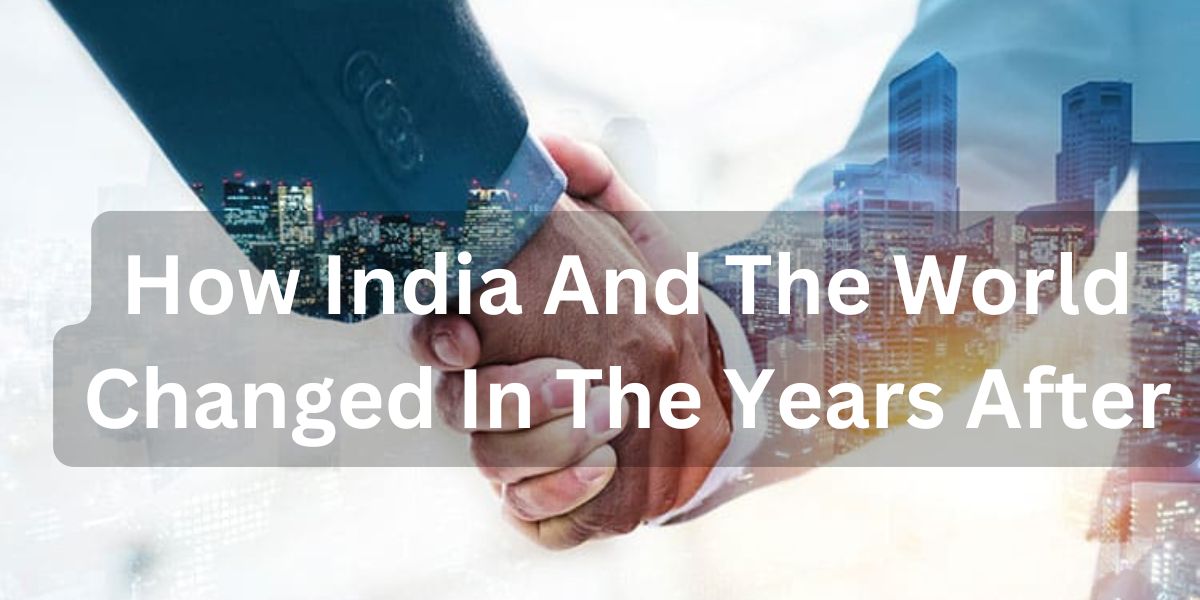How India And The World Changed In The Years After:- As the 9/11 assaults despatched shockwaves the world over, then Prime Minister Atal Bihari Vajpayee wrote to then President George W Bush on September 11, 2001: “We stand ready to strengthen our partnership in leading international efforts to ensure that terrorism never succeeds again.
Next month, then Minister of State (External Affairs) Omar Abdullah talking after the October 1, 2011, terror assault outdoors the J&Okay state Assembly for which Jaish-e-Mohammed had claimed accountability known as Pakistan “the fountainhead of terrorism in this region, in Afghanistan and in India”.
Such statements basically captured India’s place on the post-9/11 world, a few of which holds true to this present day. Some uneven waters needed to be navigated alongside the way in which; that is how the strategic recreation unfolded from India’s perspective.

Ties with the United States
One of the key shifts within the subcontinent within the new millennium was the strengthening of ties between India and the US.
The relationship, which had suffered a setback with the nuclear checks in Pokhran, was on the mend after the Jaswant Singh-Strobe Talbott talks resulting in President Bill Clinton’s go to in March 2000; it grew stronger within the years and a long time that adopted.
The Bush years led to the Indo-US nuclear deal, which elevated ties to the next strategic trajectory. The monetary disaster hit within the remaining months of Bush’s time period, and shortly afterward, Pakistani terrorists attacked Mumbai on 26/11.
New Delhi-Washington ties stayed the course underneath President Barack Obama who turned the one US President to go to the nation twice — he hosted each Manmohan Singh and Narendra Modi within the White House throughout his time period in workplace.
Under President Joe Biden, Indo-US ties have continued on the similar rhythm, particularly on the Indo-Pacific technique.
Table of Contents
Dehyphenation with Pakistan
9/11 was a told-you-so second for a lot of Indian diplomats and officers. India had suffered terror from the Nineteen Eighties onward — the Khalistan militancy and the LTTE had claimed the lives of two Prime Ministers and lots of different Indians — and the militancy in Jammu and Kashmir within the Nineteen Nineties had proven the brutal face of Pakistan-sponsored cross-border terrorism.
While New Delhi’s issues have been at all times drowned out by Islamabad’s counter propaganda, 9/11 introduced house to the west, particularly the US, the specter of terrorism emanating from the South Asian area.
9/11 gave Washington the vocabulary to problem Pakistan on the core concern of terrorism. The assaults compelled a dramatic shift in US coverage in the direction of Afghanistan and Pakistan.
While terror assaults stored occurring by way of the years that adopted — from the blasts on Mumbai’s trains to the markets of Delhi — what elevated counter-terrorism cooperation to the entrance and centre of the connection with the US was the assaults of 26/11.
“The Mumbai attacks lost Pakistan the Bush administration’s sympathy for good”, journalist-turned-diplomat Hussain Haqqani wrote in his e-book, ‘Magnificent Delusions: Pakistan, the US and an epic history of misunderstanding’.
“US Secretary of State Condoleeza Rice told then Pakistan NSA Mahmud Durrani that there were continued contacts between LeT and ISI. ‘There is material support to LeT and the LeT has just recently killed six Americans’,” Haqqani, then Pakistan’s envoy to the US, wrote.
“ISI chief Shuja Pasha visited the US for a meeting with CIA director Michael Hayden. He admitted that the planners of the Mumbai attacks included some “retired Pakistani Army officers”. According to Pasha, the attackers had ISI hyperlinks, however this had not been an authorised ISI operation,” Haqqani, stated.
The belief deficit widened after Osama Bin Laden was discovered and killed in Abbottabad in 2011— it was a transparent reminder that Pakistan was not enjoying straight with the Americans.
President Donald Trump, who adopted Obama, was indignant at Pakistan’s duplicity, which he expressed by way of the New Year’s tweet in 2018. But he quickly realised that Pakistan was key to the peace course of in Afghanistan.
The Afghanistan conundrum
America’s chaotic exit from Afghanistan in 2021 underlined the constraints to the technique of the conflict on terror.
Washington, which had been extraordinarily depending on Pakistan for the outcomes in Afghanistan, got here again to Rawalpindi in 2017-18 for the peace course of with the Taliban. For New Delhi, the alarm bells began ringing as quickly as Pakistan turned the important thing dealer.
In his ebook ‘Descent Into Chaos’, Ahmed Rashid, writer of ‘Taliban’, summed up Pakistan’s strategy in the direction of Afghanistan: “The Pakistan Army has to place to relaxation its notion of a centralised state primarily based solely on defence towards India and an expansionist, Islamist strategic army doctrine carried out on the expense of democracy.
“Members of the Afghan elite need to appreciate the opportunity to be born again as a nation, a chance they were given by foreign intervention in 2001 and international aid since then…the international community has to do far better than it has done to defeat the Taliban.
After the raid on bin Laden’s compound, the Navy Seals collected computer systems, stacks of paperwork, and scores of exhausting drives from the home. One of the important thing takeaways from that stash was that Bin Laden was planning a bid to unite the disparate factions combating the US-led coalition in Afghanistan right into a grand alliance below his management.
Writing on this within the guide ‘The 9/11 wars’, journalist Jason Burke mentioned this could have been the al-Qaeda chief’s most bold try and acceptable a neighborhood battle for his personal world one.
Many diplomats on the time instructed that New Delhi ought to keep engaged. There must be “minimal engagement”, former Indian ambassador to Afghanistan Gautam Mukhopadhaya in 2021. And the connections with the “freedom-loving” individuals of Afghanistan needed to be maintained by way of liberal visa regime, he had mentioned.

Beijing waiting in the wings
China’s rise over the past three many years has been acknowledged as maybe probably the most consequential growth of the twenty first century.
And with China’s rise — which has coincided with the US and the West’s dominance being challenged — India has discovered itself in a tough spot.
Beijing’s aggressive assertion of energy has led to contestations with international locations world wide, from the US to Australia, Japan to India. And one of many submit 9/11 world’s greatest geopolitical challenges has been to work out a method to cope with China.
New Delhi had seen this coming, and US administrations had ignored the warning indicators till Obama began speaking concerning the idea of “Pivot”. But it was not till Trump that the US clearly spelt out China as a strategic risk and a rival. This framing has continued below President Biden.
With the exit of the US, Beijing’s inventory within the area — particularly in Pakistan-Afghanistan — has risen. This has been one of many unintended penalties for New Delhi and the world.
How India And The World Changed In The Years After
Read More:-

